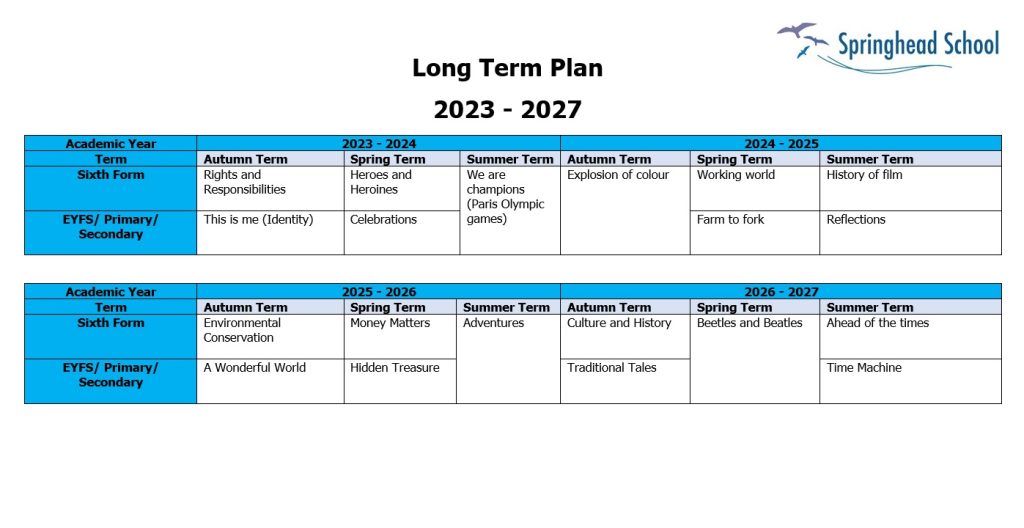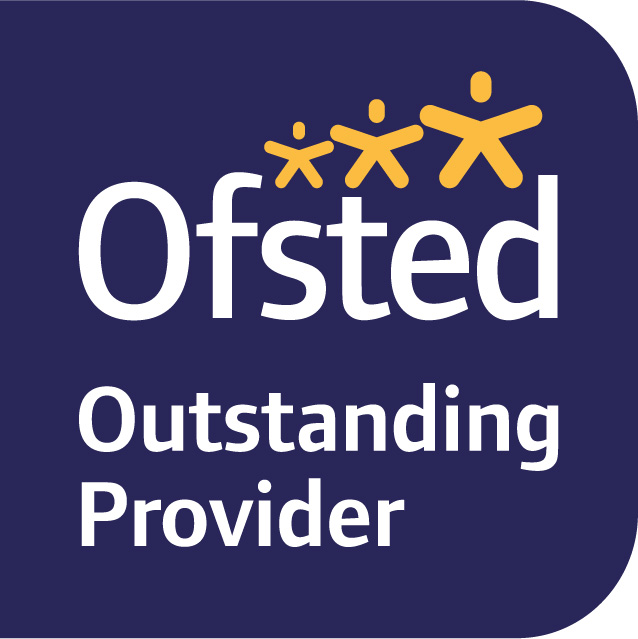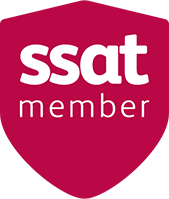Curriculum
‘Leaders have designed a core curriculum that allows staff to deliver bespoke learning to
individual pupils.’
Ofsted 2023
We are pleased to share the intent of our school curriculum. Our highly specialised approach and the content within each Key Stage of the curriculum does not only supports the development of subject knowledge, but also acts as a medium within cross-curricular skills are taught, practiced and mastered. Our curriculum also captures within ‘a moment in time’ as it is an organic document that can change in response to pupils’ needs and any opportunities that may present themselves.
Our curriculum at Springhead School is skill and context-based and encourages active engagement in learning. The curriculum focuses on developing the key skills of communication, cognition, independence, physical development and self-care, all transferrable skills that equip children and young people for life beyond school. The pupils’ learning difficulties at Springhead School cover a wide range of needs, including severe learning difficulties (SLD), where children are likely to need support in all areas of the curriculum and associated difficulties with mobility and communication, through to profound and multiple learning difficulties (PMLD), where children are likely to have severe and complex learning difficulties as well as a physical disability or sensory impairment.
Our curriculum strives to be responsive to each learner, is broad and ambitious and builds on individual strengths and interests. Throughout the school, a rolling plan is in place, which supports a balance of stimulating contexts for learning through different learning experiences, themes and subjects.
Our Moral Purpose represents a commitment to our pupils that can be expressed as a promise in each case.
• Respect – we undertake to listen to you, to enable you to speak for yourself as far as possible, and to speak up for you when you want us to
• Self-determination – we will enable you to make choices about your life
• Inclusion – we will enable you to take your place in the community
• Relationships – we will enable you to be with different groups of people and to choose your friends
• Learning – we will enable you to learn by allowing you to explore, experiment, rehearse and do things by yourself even though you will make mistakes
We offer a range of interventions across the school including Music Therapy, Pet Therapy and Dance (provided with support from We Can Dance). Please see our additional pages for more information.
Our school day runs from 9am -3pm (total of 30 hours a week) with each day consisting of a range of enriching and engaging activities for all our children and young people.
Our three core curricula
We implement our curriculum by following 3 strands within Primary and Secondary and then leading to our Post 16 curriculum at Sixth Form. Our Early Years follow the Early Years Foundation Stage Curriculum.
Pupils with Profound and Multiple Learning Difficulties (PMLD) benefit from an informal sensory curriculum which is specifically designed to meet their needs in encountering, discovering, connecting and responding.
Pupils with Severe Learning Difficulties (SLD) benefit from a semi-formal curriculum which is highly stimulating and promotes independence and develops life-skills through a thematic curriculum.
Pupils with Complex Moderate Learning Difficulties (CMLD) receive a skills and context-based adaptive curriculum of the National Curriculum which emphasises mastery and deeper learning.
Post 16 – A highly personalised curriculum with individualised pathways (underpinned by informal, semi-formal and adapted curricula) to support Preparation of Adulthood and transition beyond Sixth Form at Springhead.
We are committed to offering our children and young people with the best opportunities. We provide curricula opportunities which are meaningful, accessible, motivating, contextualised and appropriately challenging to maximise progress for each child or young person and take the learning opportunities across every aspect of the pupil’s day. This may not always be in the classroom. It could be outdoors, in the local community or further afield.
At Springhead School we ensure that the emphasis on Communication and Literacy across the curriculum is informed and effective. We use a range of augmentative or alternative strategies to promote the ability of some learners to communicate successfully, enabling them to respond and interact to their full capacity
The school follows the National statutory requirements and has regard to other national and local guidance on Teaching and Learning. Our Curriculum is bespoke to our children and young people which supports progression across the wider curriculum, against their individualised EHCP outcomes and their own next steps linked to the Differentiated Outcomes.
Our Long Term Plan topic plan below shows the focus topic covered within each phase at Springhead.

Reading at Springhead
‘Pupils learn to read when they are able to access the reasoning and recall demand of phonics. All classes read together. Staff bring stories to life for pupils with sensory needs by using related sounds and objects.’
Ofsted 2023
At Springhead, we recognise the need for a varied and personalised approach to the teaching of reading. Some pupils will need to develop early ‘readiness for reading’ skills and all pupils are assessed to identify any gaps in their readiness for reading skills before moving onto more formal reading learning. Some pupils will continue with developing these skills throughout their time at school. Some will be able to progress to decoding, and/or language comprehension and reading comprehension. Some will be able to become independent readers.
All pupils at Springhead are exposed to a wide and rich variety of stories, rhymes, songs and books, to embed a love of reading and to build communication skills whether through sign, symbols, gesture, tone of voice, facial expression, participation etc. Stories and books are selected to reflect whatever is developmentally appropriate for them, whilst still recognising age appropriateness and interests. There is considerable evidence that reading to children promotes brain development and reading skills and that it is highly beneficial for children to listen to stories read at level which is beyond their own reading ability. For some of our pupils, tracking a light or object from left to right is developing early reading skills.
The phonics programme the school uses is ‘All Aboard Phonics’, a systematic synthetic phonics (SSP) programme, validated by the DfE. No single reading method will be effective for all students with learning disabilities. Most individuals with learning disabilities will benefit from the application of a variety of methods and teachers will assess what will work best for each pupil/student.
Parents can help their child at home to practice what they are learning in school. If you are not sure if your child is doing phonics in school, please just ask their teacher. There are videos available to show you how correctly pronounce a phoneme (the sound made for a letter or group of letters) and there is also an app you can download so your child can play supporting phonics games at home. We advise only using the All Aboard resources as a consistent approach is better than mixing things from different phonics schemes.
Here’s the link you need to access these helpful resources: https://allaboardlearning.com/info/parent-info/
Mathematics at Springhead
The Springhead School Curriculum for Mathematics ensures that all pupils develop skills in both mathematical cognition as well as the content of mathematics. Pupils will learn to use mathematics as a vehicle to develop communication and interaction. This can range from the sharing of objects during a sensory story, to the involved discussion of mathematical problems. Progression in mathematics, involves deepening understanding of pattern, order and causality, and is structured to be of benefit to the social, emotional and mental wellbeing of all pupils. Pupils develop physical manipulation skills in mathematics as they use apparatus to solve and model problems.
Pupils following an informal curriculum in mathematics will develop sensory and attentional learning, including sensory play, a sense of time, emergent schematic play, gross and fine motor skills.
Pupils following a semi-formal curriculum in mathematics will focus on attentional and perceptual learning. This will include the principles of how to count, developing schematic play, enactive qualities of shape, space and measurement. Additionally, pupils will develop their numerical skills using apparatus, pictures and number symbols.
Pupils following an adapted curriculum will make progress with perception and concept-based mathematics. This will lead to outcomes including the formal manipulation of number, together with the ability to attempt worded questions.
All areas of the mathematics curriculum at Springhead School develop focus on the practical aspects of mathematics, in a way which are both useful and empathic to the individual.
Music at Springhead
Please see below a link to our Music Development Plan.




